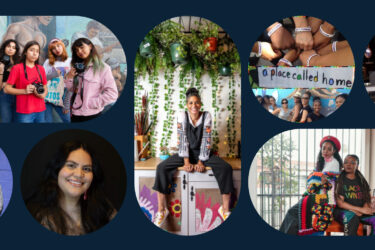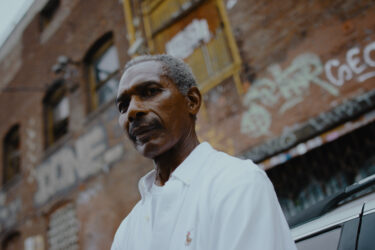Before the pandemic hit, you may have noticed some posters around your neighborhood with the question, “What are people doing to end homelessness?”
We put these posters up on buses, in alleys, on trains, and billboards throughout Los Angeles.
And despite so many of us staying home in self-isolation, we received thousands of texts from people who had seen our posters and wanted to learn more.
From the bottom of our hearts, it has been a privilege to share with you some of the stories of outreach workers who are providing life-saving services night and day across our county.
Now more than ever, the work of homeless service providers is essential.
Outreach workers were doing this work before the COVID-19 crisis struck, and will continue to provide vital services through it. They were already on the front lines, providing food, shelter, medical support, and safety for our most vulnerable. Now they are also helping to locate seniors and others on the streets who are especially vulnerable to COVID-19 and provide them with motel vouchers to get them to safety.
Many people don’t know about the outreach workers and everything they do to end homelessness. Every single day, 133 people move from homelessness into housing. That’s a huge victory that often goes unnoticed. It is our responsibility to make the public aware of this work so that everyone sees the value of it and continues to invest in real solutions.
You’ll be hearing more from these outreach workers in the weeks to come, but for now here’s one more look at what drives our real-life heroes.
Antelope Valley

“Sometimes we, as a population with housing, do not understand why people are homeless. It could be that they lost their home, their jobs, divorce. One of the major things that I see is housing. It is really difficult for people to rent on their own- I could be homeless tomorrow, you never know.”
–Audrey, Outreach Worker, LAHSA

“I know it might sound silly, but I’m trying to end homelessness. I don’t know how I’m going to do it but I’m still trying to figure out a way. I get home every day exhausted from this but it’s a good exhaustion. It’s not draining just knowing that I’m trying to make a change.”
–Eddie, Outreach Worker, LAHSA
San Fernando Valley

“In 2014, I was the only outreach worker here. Since then, there are 150 outreach workers in [this region]. Helping people is a process of trust-building, of us keeping our word, which is very important in the work that we do.”
–Eric, Outreach Supervisor, LA Family Housing

“I advocate for the homeless because I used to be homeless five years ago. I want to help the community, to give back what I was given. I was out there for five years and I had no idea that there was help out there, but then I met Eric.”
–Sonia, Peer Advocate, LA Family Housing
San Gabriel Valley

“People think all homeless are drug addicts and lazy, that’s the stigma surrounding homelessness. I meet people all the time who had jobs and homes and then had family members die and they couldn’t keep up with the bills, so they became homeless. I was homeless on these same streets of Pomona, so I like being able to come back to the city and give back.”
–Renee, Housing Navigator, Union Station Homeless Services
Central L.A.

“Our community members are some of the most vulnerable and I don’t like how on the news people often criminalize them. Homelessness is not something to be criminalized. These are people with needs and they just need care.”
–Yvette, Case Manager, The People Concern

“My clients are some of the most generous, resilient people that I have ever met. They look out for you, especially if you come on a regular basis- they have our backs and they look out for us. Once you get that trust from them, you have it for good. That’s why I love what I do.”
–Ngozi, Case Manager, The People Concern

“We wear a lot of hats, and I don’t think there’s enough hours in the day to get done what I want to get done. So we do what we can and what we are able to do, and as long as people are homeless, we’ll be out here.”
–Javier, Substance Use Specialist, The People Concern
West L.A.

“I do this because I have a personal connection, I’ve been homeless and struggled with substance use in my past, and when I was in the middle of that I had people who reached out to me and helped me. They were willing to listen to me, direct me, and get me the help that I needed. To me it’s just a way to pay it forward, and it’s something that’s really an honor for me to do.”
–Jose, Case Manager, St. Joseph Center

“[Homelessness] is a complex intersection of issues- whether it comes to stagnant wages, affordable living, housing costs, basic social service safety nets for folks, dealing with community trauma. There is a rich history of socioeconomic struggles behind this crisis.”
–Breanna, Mental Health Specialist, St. Joseph Center

“Coming from a low-income family, we weren’t homeless but we did a lot of couch surfing and we could’ve been homeless. Growing up here and seeing the community now, rent inflation and lack of affordable housing has really impacted the community. It makes me want to continue to do the work and be an advocate for the people experiencing homelessness.”
–Dawan, Director of Outreach and Engagement, St. Joseph Center
South L.A.

“If we don’t do this work, who’s going to? It’s going to take everybody in Los Angeles to reach out to somebody that’s homeless, that just needs somewhere to lay their head. Everybody deserves that. I think the misconception is that this is everybody else’s problem. It’s not everybody else’s problem, it’s our problem.”
–MaryAnn, Outreach Worker and Substance Use Specialist, PATH

“We try to do a lot of trauma-informed care. It’s asking “what happened to you?” not “what’s wrong with you?” We talk to people and humanize them. We ask them what their life has been like up to this point, how they got to where they are, and how we can help them get to where they want to go.”
–Michael, Mental Health Specialist on METRO Transit Team, PATH

“I love my job. I always envisioned trying to help people because I have been at a point where I felt like I didn’t have any services available to me and I don’t want people to feel like that at any time in their life.”
-Jose, Substance Use Counselor, SSG-HOPICS
East L.A.

“I enjoy this job very much, it’s actually a perfect job for me, it’s a perfect career. I genuinely enjoy helping people. The best part of my job is when I actually get to see somebody get housed. Usually I meet people when they are on the streets, so to see them moving into their own unit is the best part of the job.”
–Amos, Outreach Worker, PATH

“We link our homeless population to any community service there is. Sometimes quickly, sometimes slowly. We just meet them where they’re at and try to help them in all their needs. Whatever it takes. It’s a team effort- we collaborate with one another and we all want the best for our homeless population and that’s what works.”
–Jose, Outreach Navigator, PATH

“This work is a passion of mine because I have personal experience with homelessness. When I was young my dad got deported, and me and my mom and my sister were homeless for a few months. I think it’s a really big issue right now in Los Angeles, with the housing crisis and everything, and sometimes we just have to hold hope for these individuals that have run out of hope.”
–Bryan, Outreach Worker, PATH
South Bay

“Truly getting someone housed is a team effort. No one individual or one organization can do it, we need the support of one another. Getting someone housed is one of the victories that we have here, it’s very rewarding, and it makes me feel well.”
–Howard, Outreach Specialist and Housing Navigator, Harbor Interfaith

“Our goal is to help people link to services. I’m part of a team with social workers, substance use counselors, nurses, and we help people connect to whatever they need. The most important thing is to treat them as a person.”
–Gabriela, Outreach Worker, Mental Health America of Los Angeles







